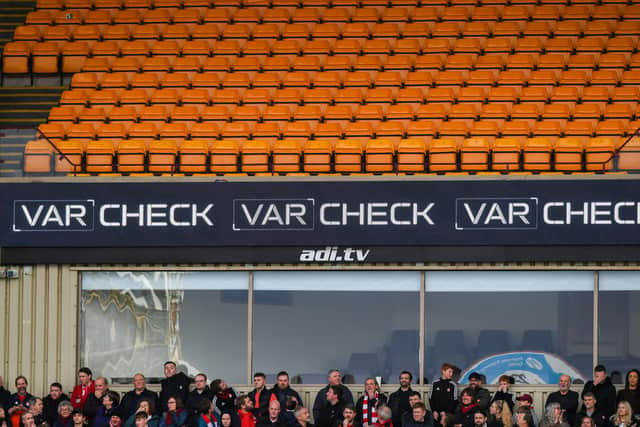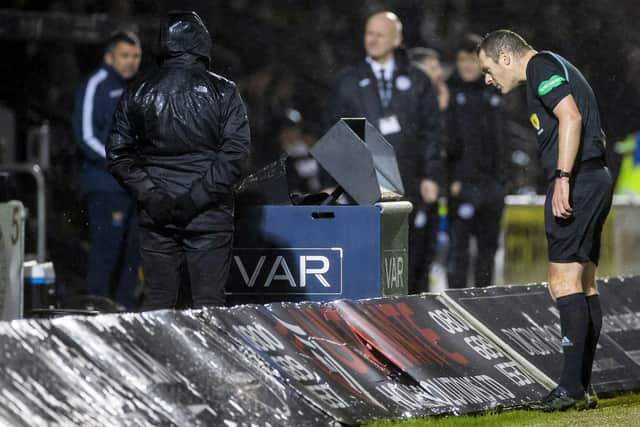VAR in Scottish football - 30 games, the investment, the benefits, the improvements but one question persists
The game shed itself of a facet which provided the Scottish Premiership with an added layer of authenticity and tradition compared to other leagues around the world when the clubs, back in April, voted to introduce the technology during the 2022/23 campaign. It came into being on October 21 when Hibs host St Johnstone. In the lead up to that game and ever since with 30 games having passed the Video Assistant Referee has not been far from the headlines. Why? What? Where? How? Questions which have since become even more common around grounds, on social media and in pubs, whether it be spectators, players, managers, media and/or pundits.
VAR has added confusion, an element of pantomime and plenty of confusion to the melting pot which is the Scottish Premiership. The questions to ponder since its introduction are ‘How has it been received?’, ‘Will it get better?’, ‘Has it been beneficial?’ and ‘Is it worth it?’. Depends who you ask, depends who you ask, yes and depends who you ask are the answers to those four questions.
Advertisement
Hide AdAdvertisement
Hide AdThe stats back up its benefit with the success rate of decisions relating to goals, red cards, penalty area incidents and mistaken identity increasing by eight per cent, from 90 to 98 per cent. What that means, without the technology, the country's decisions are getting nine out of every ten decisions correct in these instances. VAR has pushed it a lot closer to ten out of ten. The nature of football, of human decisions making and the level of subjectivity in some instances means 100 per cent is not going to be achieved. One thing, right away, it highlights is there are no agendas, no favouritism. Not that it will stop conspiracy theorists in supports up and down the country, and nor would you want it to such is their place in the Scottish football ecosystem.
Positive feedback
It is so easy to understand why referees and managers were so keen for its introduction. Regarding the former, while there is more scrutiny and pressure on them during games with the knowledge they have a device which helps them get the correct decision, it minimises a lot of the external strain and stress. Pre-VAR, if a referee got a big decision wrong it stays with them, ruminates and they have to hear about it on Sportscene or read about it in the newspapers. With VAR, there is less chance of that and more chance of getting the big calls correct.
As for managers, it should in theory prevent them from using the referee as a convenient excuse but also means that in such a cutthroat business they are not going to have their job come under pressure or potentially lose a big game, whether it be a final or league fixture, because of an incorrect decision. Both groups, managers and referees, have provided positive feedback on the impact it has had.
Better but not perfect


The good news is that it will, or certainly should, get better. Not perfect but better. The perception is that it has been done on the cheap. Scotland's top officials tucked away in a janitor’s closet, hunkered over some screens, battering the side of the monitor every now and then when it goes fuzzy. That perception was strengthened following an offside call on Celtic star Jota at Fir Park when one of the cameras hadn't panned out quick enough. VAR, as well as the linesman, got the decision correct but it didn't prevent the inevitable consternation.
The reality is somewhat different. The approach has not quite been the 'spared no expense’ mantra of Dr Richard Hammond when he attempted to open Jurassic Park but a considerable expense – upwards of £1million – has been invested by the clubs. The technology can't be faulted. Scotland has more cameras than the minimum of four required to operate at games. More than the Brazilian, Turkish and Australian top flights. The same number as MLS. The set up in Baillieston, despite its understated location, is as good as anywhere in world football with its control room, referee observation desks and bank of monitors for the VAR. The covered windows and low light gives the impression of a shady, underground movement getting ready to crash the banks and overthrow the government when in fact all they are trying to do is help Euan Anderson decide where the ball hit St Johnstone's Connor McLennan on the arm.
Fan experience
There is a clear determination to reduce the number of on-field reviews to meet the global average, as well as improving on the average time for the on-field review from the current 2.33 minutes. That should come with time and further experience, while a better idea of which referees are stronger operating as VAR is formed. There is also an awareness that communication can still improve to allow the spectator a clearer idea of what is going on. Even if it is after the fact, explanations could perhaps improve fans’ understanding of not only why a decision was made but also the laws of the game.


It leads onto the final and most important question. Is it all worth it? Are those extra eight per cent of correct decisions worth it for the impact on the spectator experience? There has yet to be any significant consultation done with Scottish football's most important stakeholder. The realist would accept there may never be. Even with the positive stats, the positive feedback, the impressive VAR set-up and investment, until there is appreciation of the match-going fan and their view is sought, it is always going to be hard to accept VAR into our game.
Comments
Want to join the conversation? Please or to comment on this article.